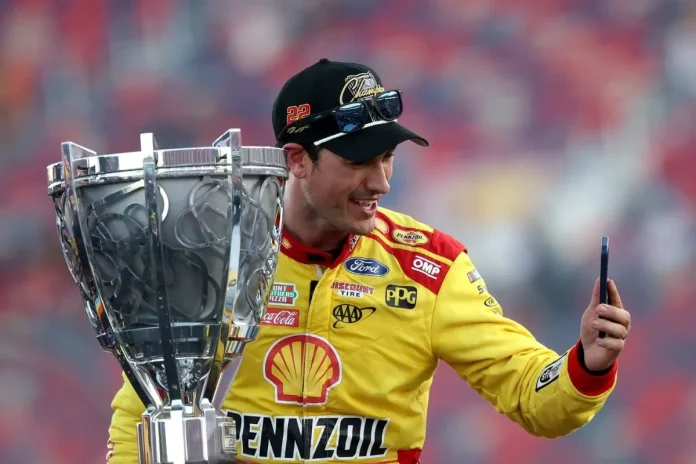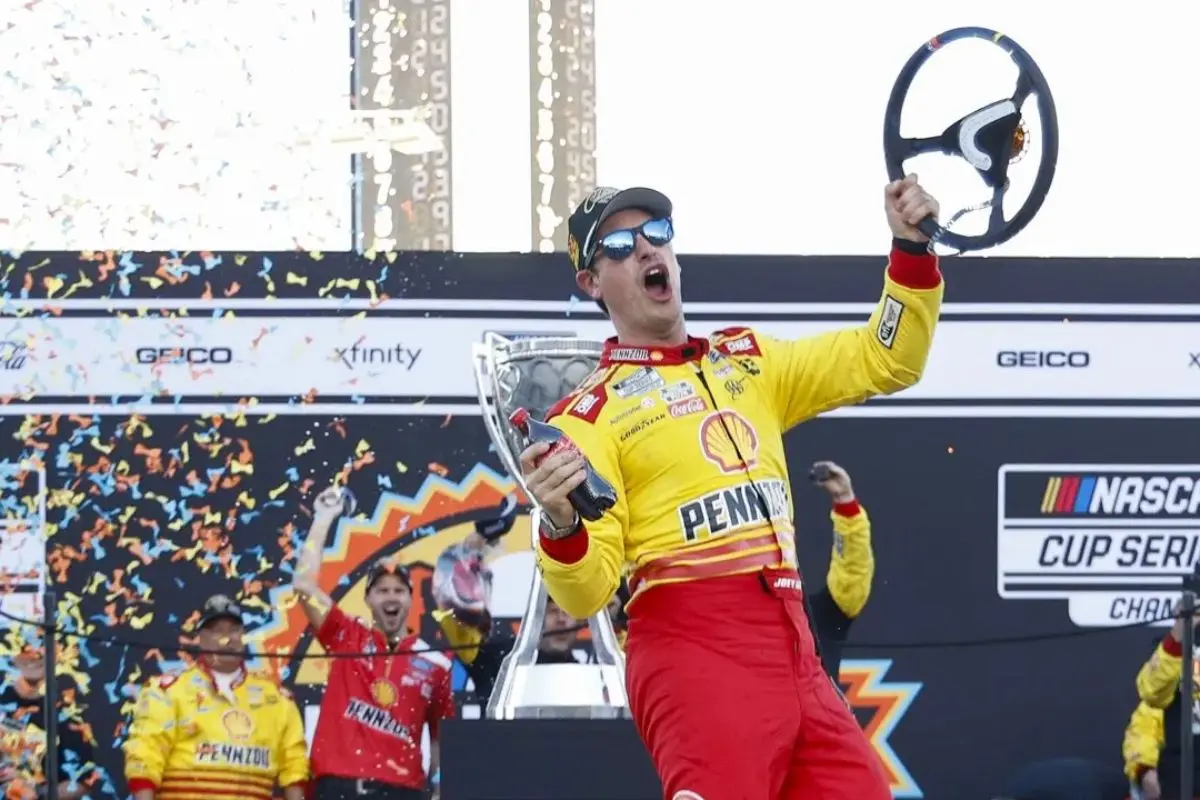Joey Logano’s third Championship win is a mix of skill and controversy. His performance during the NASCAR playoffs showed his ability to handle tough moments, proving he’s a skilled driver who can adapt. However, some critics argue that luck had a big role in key moments, like race disqualifications, which make people question the fairness of NASCAR’s playoff system. Whether it’s pure talent or a bit of luck, Joey Logano’s win sparked plenty of debate
Key Highlights
- Logano’s third championship highlights his consistent performance and tactical skill across various tracks, showcasing his deserving nature as a champion.
- His playoff success emphasizes adaptability and precision in high-pressure situations, setting him apart from competitors.
- Criticism of the playoff format raises questions about luck versus skill, yet Logano’s statistical consistency supports his championship legitimacy.
- Team Penske’s culture and advanced strategies enhance Logano’s performance, reflecting a collaborative effort behind his victories.
- Despite debates over luck, Logano’s dedication and hard work contribute significantly to his achievements in NASCAR.
Joey Logano’s Historic Third Championship
Although the NASCAR playoffs have long been a battleground for elite drivers, Joey Logano’s recent victory marks a significant moment in the sport’s history. By clinching his third NASCAR Cup Series title, Logano has not only cemented his status as a formidable competitor but has also placed himself in an elite category previously dominated by legends like Jimmie Johnson. This achievement is remarkable; it signifies a paradigm shift in the competitive landscape of NASCAR, particularly since Logano’s success has come under the contemporary elimination format established in 2014.
Logano’s success is indicative of both skill and tactics. The ability to consistently perform in high-stakes situations, particularly during the playoffs, highlights his adeptness at maneuvering through the complexities of racing under stress. His statement, “I love the playoffs, I love it man,” encapsulates a mindset that is essential for any champion.
Yet, this raises questions about the nature of success in NASCAR. Is Logano’s victory a product of sheer talent, or does it also reflect favorable circumstances, including team dynamics and tactical decisions made during critical moments?
While detractors may argue that luck plays a role in any championship run, Logano’s accomplishment is a reflection of his resilience and strategic skill. This historic win not only reshapes his legacy but also challenges the perception of what it means to be a champion in the constantly changing world of NASCAR.
Analyzing Joey Logano’s Performance and NASCAR Playoff Success
Consistently, Joey Logano has proven his ability to excel in the high-stress environment of the NASCAR playoffs, despite his general season statistics falling short of his peers. While drivers like Kyle Larson and Christopher Bell have dominated the season with impressive win totals and lap leads, Logano’s playoff performance has enhanced him to championship glory. This discrepancy raises critical questions about the nature of success within the current format.
To analyze Logano’s playoff success, consider the following points:
- Playoff Precision: Logano has exhibited a remarkable knack for maneuvering through the playoff rounds, often capitalizing on critical moments that define a race’s outcome. His ability to perform under stress sets him apart from his contemporaries.
- Strategic Execution: Team Penske’s race strategies have often aligned seamlessly with Logano’s driving style, allowing him to optimize his potential during the playoffs. This synergy has proven beneficial in securing key victories when they matter most.
- Adaptability: Logano’s adaptability to diverse race conditions and tracks has been a crucial element of his playoff success. Unlike the regular season, where consistency reigns, playoffs demand a different level of tactical insight, which Logano has consistently delivered.
While critics may question Logano’s general performance relative to his rivals, his ability to shine in the playoffs highlights a different kind of excellence—one that is not merely about statistics but rather about seizing opportunities when they arise.
Criticism of the Playoff Format and Logano’s Win
The recent championship victory of Joey Logano has ignited a considerable debate regarding the legitimacy of the NASCAR Cup Series playoff format. Critics argue that Logano’s route to the championship highlights the flaws inherent in a system that prioritizes luck over consistent performance. Journalist Justin Long articulated this sentiment, pointing to Logano’s entry into the playoffs, which hinged on a dramatic win in quintuple overtime at Nashville—a race where he was positioned 15th before a series of fortunate events unfolded.
“Logano’s win, hate it or not, is going to draw questions about the legitimacy of the #NASCAR Cup Series Playoff format,” he said. “He only made it into the Playoffs due to a win in quintuple overtime at Nashville, a race where he was around 15th at the time the scheduled distance of the race was completed. A lot of crashes and fuel tanks running dry led to a win.” – Justin Long
Long further highlighted Logano’s rollercoaster playoff experience, noting his elimination in the Round of 12 only to be reinstated due to Alex Bowman’s disqualification. Such developments introduce an element of unpredictability that some fans view as detrimental to the sport’s integrity.
While Logano ultimately showcased mastery in the championship race at Phoenix, leading 107 laps, the preceding luck he encountered casts a shadow on his achievement. Critics contend that this playoff structure rewards tactical manipulation of circumstances rather than pure racing talent.
“He was eliminated from the Playoffs in the Round of 12, but was re-added to the Playoffs following a DQ for Alex Bowman at the end of the Charlotte ROVAL, the final race of the round…Logano then utilized a fuel mileage strategy to secure the win in the Round of 8 opening race at Las Vegas, which secured his place in the Championship 4.” – Justin Long
As Long succinctly put it, “Don’t hate the players, hate the game.” This sentiment encapsulates the broader dilemma facing NASCAR: is it time to reevaluate a playoff format that can diminish the significance of sustained excellence in favor of serendipity? The debate is likely to evolve as fans and stakeholders grapple with what constitutes true merit in the pursuit of a championship.
“Then Logano and Wolfe picked a fine time to have their best performance of 2024, as he led 107 laps on his way to winning Sunday’s race at Phoenix to win the championship. They played the system, and they were rewarded with a title. Don’t hate the players, hate the game.” – Justin Long
Roger Penske’s Role in Logano’s Victory
Amidst the discussions surrounding the playoff format’s impact on Joey Logano’s championship win, the influence of Roger Penske cannot be overlooked. As the owner of Team Penske, his fingerprints are all over this victory, shaping both the strategy and the culture that propelled Logano to success.
Penske’s legacy in motorsports extends beyond mere ownership; it embodies a relentless pursuit of excellence, a principle that the No. 22 team has adopted wholeheartedly.
Penske’s understated acknowledgment of his team’s efforts—“It’s all about the people”—hints at a deeper truth: his leadership has cultivated an environment where talent flourishes.
“My name might be on the door, but it’s all about the people who make the difference and we sure have them on this team.” – Roger Pensk
This victory can be attributed to several key factors:
- Strategic Vision: Penske’s experience in racing has always revolved around seeking out competitive advantages, whether through technology, team dynamics, or race strategy.
- Team Cohesion: The culture Penske has fostered emphasizes collaboration and trust, allowing the No. 22 team to work seamlessly under stress.
- Innovative Practices: Drawing on his historical skill in the sport, Penske has consistently encouraged innovation, pushing boundaries to stay ahead of the competition.
Roger Penske’s Modern Approach and Strategic Mastery
While steering through the complexities of modern NASCAR, Roger Penske has demonstrated a remarkable ability to adapt his strategies in alignment with the evolving competitive landscape. This adaptability has been crucial in ensuring Team Penske remains a formidable force, especially as NASCAR’s playoff format has introduced layers of unpredictability. Despite occasional setbacks, such as penalties for both Logano and other Penske drivers, the team has consistently shown an acute understanding of the sport’s dynamics.
While critics may question the legitimacy of Logano’s championship win amid NASCAR’s contentious format, it is crucial to recognize that Team Penske’s success stems from meticulous planning and execution. The team has turned potential chaos into calculated opportunities, often outmaneuvering competitors who struggle with the same format.
Ultimately, Penske’s modern approach has not only led to Logano’s second championship but has also solidified the team’s status as a guiding light of tactical excellence in NASCAR. The confluence of experience and innovation under Penske’s leadership emphasizes a narrative of deserving success rather than mere luck.
News in Brief: Joey Logano’s Third Championship Win
Joey Logano’s tertiary championship victory ignites a debate surrounding merit versus fortune within competitive racing. While his performance and playoff success reflect considerable skill and tactical prowess, the controversial NASCAR playoff format raises questions about the legitimacy of his achievements.
Moreover, Roger Penske’s influence and groundbreaking strategies undeniably contribute to Logano’s success. Ultimately, this championship prompts a reevaluation of what constitutes true deservingness in the domain of motorsports, challenging traditional notions of victory and meritocracy.
ALSO READ: Joey Logano Faces Severe Penalty Before Phoenix Finale as Team Loses Pit Selection




